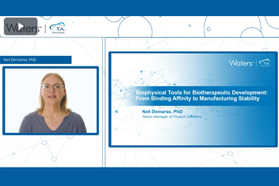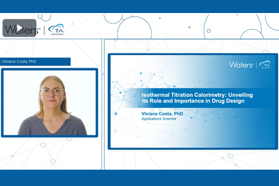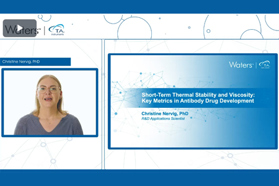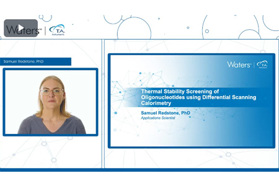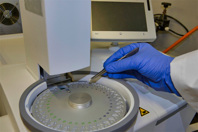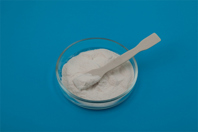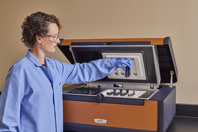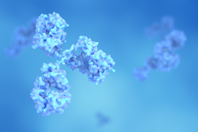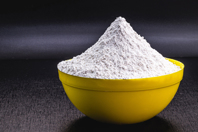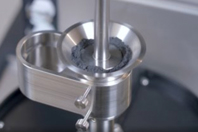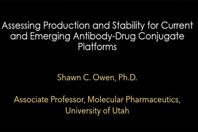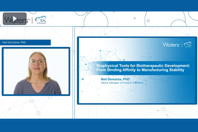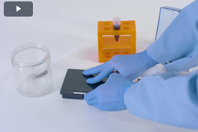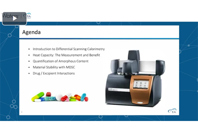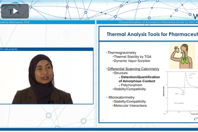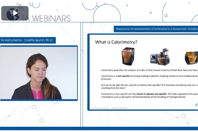
ABOUT TA INSTRUMENTS
TA Instruments (a division of Waters Corporation) is the world leader in manufacturing industry-leading systems for thermal analysis, rheology, microcalorimetry, and mechanical analysis. We offer innovative and reliable instruments that help scientists in top laboratories test the physical properties of their materials. Our instruments contribute to leading discoveries in materials science, medicine, medical devices, and other areas of science devoted to improving our world. With direct operations in 24 countries, we are uniquely positioned to support all our customers with an extensive local support network. We are committed to providing high reliability and high-performance products to meet the needs of our customers.
MINI WEBINAR SERIES
FEATURED CONTENT
-
Thermal analysis reveals how particle size and morphology influence material interactions and stability. Learn how DSC and MDSC techniques uncover compatibility issues and guide better excipient selection.
-
Isothermal Titration Calorimetry is a powerful technique for analyzing biochemical binding events, which is crucial for understanding molecular interactions and enzyme kinetics in biomedical research.
-
Freeze-drying stabilizes biologics but requires optimizing parameters like temperature and structure. Explore how modulated DSC™ improves precision in analyzing transitions.
-
Rheological Properties Of Pharmaceutical Excipients: Lactose Monohydrate And Carboxymethyl Cellulose
Explore lactose monohydrate and CMC rheology, highlighting their flow, cohesion, and compressibility properties to optimize pharmaceutical formulations under varying stress and temperature conditions.
-
Moisture impacts pharmaceutical ingredients’ stability and efficacy, causing phase changes and hydrate formation. Discovery SA enables humidity and temperature profiling for improved drug formulation.
-
Modulated DSC addresses challenges in pharmaceutical material characterization, enabling precise analysis of glass transitions, and overlapping transitions, enhancing insights beyond standard DSC.
-
Complementary analytical techniques like DSC, MDSC, cRHp, DVS, and SolCal accurately quantify amorphous content in pharmaceuticals to ensure stability, compatibility, and efficiency.
-
Thermal analysis techniques provide valuable insights into pharmaceutical material properties, ensuring compatibility, stability, and quality control in drug development and production processes.
-
Biodegradable polymer microspheres control drug release through crystalline and amorphous properties, analyzed using DSC, MDSC, and TGA to determine composition and stability for precise delivery.
-
Isothermal microcalorimetry (IMC) rapidly screens API-excipient compatibility, detecting physical and chemical interactions faster than conventional methods, saving time and effort in pharmaceutical formulation development.
-
Learn more about a differential scanning calorimeter that offers thermal stability screening of buffer formulations and protein sequence modifications.
-
Uncover how innovative Rapid Screening-Differential Scanning Calorimeter technology is enabling robust analysis and regulatory compliance by ensuring the thermal stability of antibody drug products.
-
Explore data demonstrating the effectiveness of a rapid screening-differential scanning calorimeter as well as its detection limits and the range of concentrations suitable for DSC analysis.
-
We analyze drug-excipient incompatibility using a microcalorimeter system equipped with a multi-sample cell capable of simultaneously measuring highly sensitive heat flow data from up to three samples.
-
Here, we review applications of Nano DSC and ITC for studying the stability of virus particles and their binding to cells, as well as for the identification of viruses.
-
Explore the performance of an instrument with data analysis software capabilities that easily deconvolutes thermograms, enables differentiation between individual and interacting domains, and reports accurate Tm values.
-
Carboxymethyl cellulose powder is a hygroscopic material used in a variety of applications. Here, the impact of moisture content on cohesion strength is measured using a shear cell accessory.
-
Powder rheology is a useful tool for formulating and optimizing tablet processing conditions. Investigate the influence of moisture content and substrate material on carboxymethyl cellulose powder wall friction.
-
Learn how a DSC thermogram was able to detect and quantify the differences in varying drug loads with respect to thermal parameters including Tm, Tonset, and enthalpy (ΔH).
-
Isothermal titration calorimetry (ITC) is a technique where heat is measured under constant pressure. Explore advances that will enable investigators to expand their research using ITC.
CONTACT INFORMATION
TA Instruments
159 Lukens Dr,
New Castle, DE 19720
UNITED STATES
Phone: 302-427-4000
Contact: Customer Service and Support
FEATURED PRODUCTS AND SERVICES
BROCHURES
E-BOOKS
-
Thermal stability testing is essential for biologics development to help ensure safety and efficacy. Learn how thermal data supports candidate selection, formulation, and storage decisions.
-
See how today’s leading instrumentation helps researchers get crucial information more rapidly, enabling them to get to clinical trials faster with more reliable products.
WEBINARS
-
ADCs with similar antibody sequences can behave differently due to linker and payload choices. Analytical tools reveal structural and stability differences critical to therapeutic performance.
-
Unlock innovation in biotherapeutics with expert insights into DSC and molecular stability. Learn how biophysical techniques can optimize formulations and enhance nucleic acid stability.
-
Explore how Isothermal Titration Calorimetry empowers drug discovery, as well as learn about ITC fundamentals, how to eliminate weak candidates, and how to optimize development decisions.
-
Discover essential analytical techniques in biotherapeutics development, as well as explore ITC, DSC, and Rheology—powerful tools for understanding formulation, stability, and efficacy in drug development.
-
Explore key techniques like DSC and Rheology to assess thermal stability and viscosity in antibody drug development. Gain practical insights to enhance biologic candidate selection, formulation, and delivery.
-
Join Dr. Ladbury to explore how thermodynamic data can enhance our understanding of protein-ligand interactions and how it is crucial for optimizing drug efficacy and safety in pharmaceutical development.
-
Achieving precise measurements in a high-throughput setting can be challenging without disrupting workflows or deadlines. Learn about a new tool for rapid biotherapeutic thermal stability characterization.
-
Explore key rheology concepts and terminology, and learn how to generate the required rheological profiles using high-performance instruments.
-
Explore the use of Differential Scanning Calorimetry (DSC) multi-sample technology to analyze a variety of pharmaceutical materials and understand critical information for advancing pharma development.
-
Here, we focus on how the apparent melting approach can provide a rapid screening protocol for the detection and analysis of drug-excipient incompatibility in mixtures and formulas.
-
Here, we compare theory and results for thermodynamic and apparent melting and explain why it is important to distinguish between them when interpreting results from DSC.
-
We dive into DSC testing and analysis of pharmaceutical materials to better understand how to obtain accurate results and avoid potential problems with data interpretation.
-
Here, we will explore how to quantify the glass transition temperature of an amorphous pharmaceutical solid through the use of Differential Scanning Calorimetry (DSC) and Modulated DSC.
-
Here, we explore enthalpy screening, a new and recently published ITC technique that is showing promise for rapidly and accurately characterizing the binding enthalpy of new drugs or biotherapeutics.
-
Lear about advanced characterization techniques to assess antibody-drug conjugates (ADCs) and antibody-fusion proteins.
-
Differential Scanning Calorimetry (DSC) is typically used during biopharmaceutical development to characterize a biomolecule. Here, we demonstrate the suitability of DSC for studies of opaque solutions and slurries.

